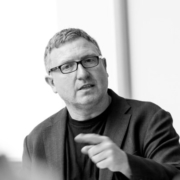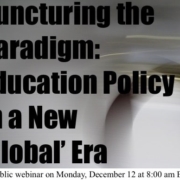This year the Comparative and International Education Society’s Globalization and Education Book Award goes to Suhanthie Motha for her book Race, Empire, and English Language Teaching: Creating Responsible and Ethical Anti-Racist Practice.
This book smoothly and bitingly makes connections between globalization, the spread of English and English language teaching, and colonialism and empire. It is an accessible read which we hope spreads widely among both academics and teachers/practitioners. Sincerely, we hope as many people as possible, both within the larger TESOL community and beyond it, have a chance to read this excellent book.
Citation: Motha, Suhanthie, interview with Will Brehm, FreshEd, 24, podcast audio, April 18, 2016.https://freshedpodcast.com/suhanthiemotha/
Rolf Straubhaar 0:43
Suhanthie Motha, welcome to FreshEd.
Suhanthie Motha 0:46
Oh. Thank you for having me, Rolf. I’m honored to be here.
Rolf Straubhaar 0:49
So, for those who haven’t had a chance to read your book yet, could you summarize your main points?
Suhanthie Motha 0:55
Yeah, absolutely. So, Race, Empire and English Language Teaching is essentially the story of a study. If you read the back jacket, you’ll see that it’s presented as the story of a study of four early career teachers, Alexandra, Jane, Katie and Margaret. They taught with this school district called ESOL or English to Speakers of Other Languages, which I know is a problematic term. But really, it’s more complicated than that. The book intertwines numerous stories of which many are not stories from this study. And almost all of these stories turned up unexpectedly as sort of uninvited guests in the book as I was writing it. I discovered as I wrote about the events in these four classrooms, and about the conversations that the teachers and I were sharing, as we sort of gathered regularly for afternoon tea together over the course of a school year. I found that I couldn’t talk about their practice and their pedagogies as separate from those of English teachers all around the world, nor as separate from the entire history of global English language spread. And I found I couldn’t talk about what constitutes knowledge or pedagogy for teachers, without talking about race and empire because it sort of dawned on me as I was thinking about it that the entire disciplinary base of the English teaching profession is not only embedded in ideologies of race and empire but the profession is actually predicated on them. It actually depends on them for its existence and its logic.
The whole notion of what counts as English is an inherently racialized construct. And so, I should say, I’m using this term empire. I was initially thinking separately about colonialism, or coloniality, or globalization, or late capitalism, or neoliberalism, especially as these relate to multilingualism. But in particular ways, these are all parallel processes. So, I’m using the collective term empire. It’s a placeholder really, and it’s an inadequate placeholder to describe the varied and complicated processes by which some states end up acquiring and maintaining power and control over others. And it’s impossible to talk about empire without talking about race. I think about the fact that historically, the English language was transmitted primarily from speakers coded as white to learners considered non-white. And of course, you know, using words like coded and considered because contemporary genetic research has helped us to actualize and really dispute the systems of racial categorization we’ve been working with all these centuries, and particularly that became solidified during European colonization. And in fact, in some ways, as a tool of colonization. So, to speak of colonialism is to speak, whether explicitly or not, of race.
So, I’ve come to see racialization as inevitably salient in English language teaching. This book draws on many different pieces but heavily on the experiences and theorizing of Alexandra, Jane, Katie, and Margaret. These four teachers helped me to put many of these pieces together. And their experiences were by far the most clear illustrations for me of the interconnectedness of race and empire within the TESOL profession. The stories and moments described in the book are really mundane and are notable for their ordinariness. They could have taken place in any classroom in this country. During their teacher ed program, Alexandra, Jane, Katie and Margaret had been supported in thinking about how English learners produce appropriate sounds, master correct grammatical structures, acquire larger vocabularies, come to sound like native speakers. They went through the same master’s program that I did but as they entered their classrooms, the teachers found themselves called upon to engage with all sorts of questions that they hadn’t had a chance to think about before. For instance, how to negotiate students’ access to privileged forms of English while maintaining a critical eye towards accent hierarchies. Or the salience of teachers’ own racial identities in their practice. Three of them identified as white, and they’re all what we would call native speakers of standard English. So, they started encountering these very racialized challenges but because their training and my training hadn’t equipped us with the scaffolding to help us think about these challenges through the lens of race, we were using other maybe less helpful theoretical framings, which were really becoming euphemisms for race. So, in a way, the book is about how race and empire began to relinquish their invisibility to us and about our coming to understand whose interests had been served by their erasure. Shall I tell you a little bit about how the book is structured?
Rolf Straubhaar 6:25
That would be great.
Suhanthie Motha 6:27
Okay. So, the book is divided into six chapters. It starts out with a preface, which was actually, interestingly enough, never meant to be in the book. It was meant to be just a tool that sort of eased me into the writing. But when I shared it with the teachers, my participants, they wanted me to leave it in. After the preface is the first chapter, the introduction. So, my primary argument is that global inequalities exist. They fall along lines of race and colonial history. And the English language and specifically, the English teaching industry, are instrumental to the persistence of these inequities. So, I’m arguing specifically for a reframing of the discipline, particularly within its teacher education efforts, to acknowledge its rootedness in race and empire and language ideologies. Not just internationally but here in the US and in other English dominant contexts too. So, the second chapter situates the work theoretically and it gives some background about Alexandra, Jane, Katie, and Margaret, the schools, the study, the afternoon teas, and some of the tensions in doing this type of work. Work with ethnographic roots whose methods can be colonial and appropriating and exploitative, and, you know, just the politics of telling someone else’s story.
Rolf Straubhaar 7:56
Yeah, absolutely.
Suhanthie Motha 7:58
And then the next three chapters are really the body of the book. They focus respectively on empire, race, and linguistic ideologies, which of course are, completely inseparable from each other. But by shining a flashlight first on empire, I hope that the reader is able to see that argument clearly. And then in the next chapter, I bring in race and I illustrate how racialization can’t be detached from empire. And then in the third of those chapters, I demonstrate the inextricability of language ideologies from race and empire. So, in the first of these three chapters, I talk about the social and institutional arrangements of ESOL. ESOL as a school construct. So, the ways in which the boundary between ESOL and non-ESOL, between English learner and English speaker, between native and non-native, get reinscribed. So, for instance, the fact that in public schools, ESOL is usually completely separate department from English with different faculty, separate scheduling. And even though it’s the same in our universities, at my institution, the building that houses the Intensive English Program isn’t even on the campus map. It’s a couple of streets over, it’s off campus, and it has a completely different structural relationship with the institution than other departments do. It’s part of educational outreach, it’s for profit, there’s a level of exploitation that we don’t see in our English lit or our composition classes. And I’m not saying that my institution or educational outreach are evil and devious. I actually love my institution. This is a really common arrangement. And it’s not deliberately exploitative but rather it’s based in a type of common sense thinking that has simply remained unquestioned for decades, even centuries. The assumption that there is a division between English for native English speakers and English for non-native English speakers and that there’s a way in which these are cleanly separable.
Rolf Straubhaar 10:05
Yeah.
Suhanthie Motha 10:07
And I also talk in that chapter about teasing like this taunt. You can’t speak English which I heard over and over again, which also reinforces that border. It sets up what Ingrid Gogolin calls monolingual habitus, or the sort of push towards monolingualism as normative in the social imaginary. The idea of you’re speaking anything other than English, you must not know English. And I make the argument that English is what Sara Ahmed has termed, a happy object. That we’ve been taught through a network of nodes to associate English fluency and English nativeness with happiness despite much evidence that English doesn’t always deliver on its promises.
Rolf Straubhaar 10:52
Yeah. The Woody Allens of the world.
Suhanthie Motha 10:54
Yeah. Definitions of adequate English get revised right? And it becomes this shifting target. It’s unattainable. People remain coded as being an ESOL because of their accent, their race, or their previous association with ESOL services. And then the more the English teaching industry holds up English as this golden keys spoken by shiny, happy people, the more desirable it becomes which fuels the market. And I talk a bit in that chapter about the tensions between language support and segregation. You know, on one hand, we don’t want divisions between ESOL and non-ESOL but on the other hand, students do better with specific language support. So, that’s a challenge for teachers to negotiate. And then in the next of these three chapters, I focused on race. On the fact that most ESL teachers in the US identify as white and most students are coded as racial minorities within a history of English being transmitted in a sort of unbalanced, coercive and sometimes even violent context. So, I talk about how these silences around race were sustained in the study, and how the silences helped to maintain the pretense of ESOL a being racially neutral side of learning. I asked questions about hybrid language practices and the sense that code meshing and translingualism and linguistic flexibility are gaining recognition as legitimate language practices. But I also note that different contexts implicate different power dynamics with minority languages or hybrid language practices, often tending to be confined to low status situations. So, all that does is sort of reaffirm them as atavistic and regressive and incompletely incorporated into the formal institutions. And then I look at this notion of linguistic passing as a native speaker. The literature on passing from race studies is sometimes -sidelined- sometimes considered a little passe. So, I hesitated to draw on it. But I do think that applying the concept of passing to language identity raises interesting questions because the mere possibility of passing as a native speaker poses a challenge to linguistic essentialism, and somehow demonstrates the frailty of that category.
And then I have a big section on teachers’ identities, which is actually my current line of research right now. I think it’s really important because it seems that this association among ESOL teacher identity, and whiteness, and native speakerness is kind of a crucial part of the profession because if these associations remain, then they serve as a foil to student identity. You know, regardless of what the teacher and student really look like, teacher identity matters on an individual level but also in terms of the formation of the profession. The logics of the profession. And then the third of these three chapters is on language ideologies. I’m looking at how languages and language varieties are territorialized or attached to specific places, and then I question the feasibility of rupturing that connection. So, an “aha” moment for me in this chapter related to world Englishes. In one of the school districts of the study, the most commonly spoken language of the ESOL students on the roster, as you know, that the teachers received was listed as World English, which was a label we all sort of accepted uncritically. And it was only when I watched -there was a white Scottish boy in a hallway. He wasn’t in ESOL. I didn’t know him at all. And he was talking to a teacher and then he left and I realized I hadn’t understood a word he said. Like my ear hadn’t had a chance to adjust to his accent before he had disappeared down the hallway. And in that moment, it occurred to me that World English was a category framed around race rather than intelligibility. Intelligibility is heavily socially-constructed and racially-constructed. And that the persistence of the category World English as part of school policy was keeping those varieties marked and devalued. And not just in the school but as a part of a global effort to sort of coax into Anglicization, varieties of English that are not associated with whiteness. And all of this inadvertently, of course, you know, I mean, intentionality is a theme that runs throughout the book. And then the last chapter is mostly about implications. I provide some examples of curriculum transformation efforts, and some lesson ideas like mock debates about restrictive language policies. When you learn about a famous war, talk about how the war changed language contact patterns, critical text analyses of banned books or math graphing activities that look at differential achievement based on language identity. I tried to sort of provide some scaffolding for thinking concretely about what it means for classrooms. And then finally, I talk about policy, about how we can’t depend only on teacher-instigated efforts. And what we really need is policy level change. And then the question that I think the book leaves us with, which I’m afraid I don’t answer, but the question is, must racism and empire necessarily inhabit the teaching of English? Is it possible to participate in English language teaching in a way that’s responsible and ethical and supports consciousness of the consequences of our practice in our students and in ourselves?
Rolf Straubhaar 17:04
Yeah. Even if we can’t necessarily extricate ESOL, or whatever it’s called in any context, from the historical milieu it’s been constructed in, can we engage with that on a personal level in a more responsible or ethical way?
Suhanthie Motha 17:23
Yeah.
Rolf Straubhaar 17:24
That’s fascinating questions. And honestly, the way you ended, especially with these practical considerations is one of the things that we, as a committee, really, really enjoyed was that this felt like a very grounded book. A book that is not just a collection of intellectual ideas around empire and race that arouse your passions and make you want to create change but also gives you some concrete ideas of how you might go about doing that. But could you tell us a bit more about how you became interested in the role of race and empire in TESOL, more generally, and how TESOL functions and so forth? What made you interested in these questions?
Suhanthie Motha 18:05
Yeah. So, on one level, I didn’t even know I was doing a study on race until it was finished. But on another level, I’ve been interested in the racialized nature of English all my life. As a person of color whose Sri Lankan family voluntarily relinquished our heritage language, which was Tamil to English four generations ago. And not through migration but actually in Sri Lanka. I became interested in what counts as coercion and consent and complicity and in the power dynamics that shift with proximity to different languages. And then I grew up mostly in a small city in Australia where I came into contact with very few people of color, and really not talking about race ever. So, I can’t help but be fascinated by the ways in which we’re able to make race invisible.
Rolf Straubhaar 19:02
Yeah. Interesting. And what brought you to your conclusions? The ones that you’ve just summarized so well. And did the research that you’re documenting here, was this more a confirmation of things you had already felt, of instincts you already held just from your own personal experience as an ESOL educator or elsewhere? Or were these things that as you were saying, really came more through the research process?
Suhanthie Motha 19:30
Well, yeah. The most surprising thing about the book is that this isn’t the book I set out to write. I thought that I was writing about teachers’ agency and their sources of knowledge and in particular, their sort of epistemological negotiations of their context. So, really, I was looking at how they reconcile what they learned in grad school with their public school context. And then suddenly, the study was about these threads that were never a part of the dissertation proposal. So, no, it wasn’t as though I went into the study with a hunch that I got to test out and confirm. It was much more like, I thought I was studying one thing and then I realized I was studying another, and I wrote a book about what conditions made it possible for me to be so oblivious.
Rolf Straubhaar 20:19
Hmm. Yeah. And thankfully, your dissertation committee was okay with that.
Suhanthie Motha 20:25
Yeah. That is a really big piece of it. Yes. I had the support to sort of follow my instincts, follow my hunches, follow my changing interests. Yeah.
Rolf Straubhaar 20:40
So, one question that our whole committee had when we were talking about the book was, we’re really curious how this book had been received by the TESOL community, especially if you had received any pushback from other TESOL practitioners or scholars?
Suhanthie Motha 20:55
Yeah. So, I just returned from the TESOL conference. And then followed by AERA, the American Educational Research Association meeting -which just ended this week- where I actually felt a really warm response. People were really lovely to me. The book reviews have been positive, the books won a couple of awards now. People have been very welcoming, especially considering the difficult and controversial nature of the content. I was really worried about undertaking this project. And I do feel that it chose me rather than me ever making a conscious choice to do it. I’m so uncomfortable talking about race, which I know must sound hilarious given the line of research I’ve ended up in but, you know, like many folks, I didn’t grow up talking about race. So, I do worry about choosing words poorly on the fly. At the same time, I think it’s this invisibility that allows unintentional racialization to fester and do harm. So, I feel that I have to sort of forge forward and just trust those around me to extend grace to me if I need to backtrack or reflect on my words. And I do feel that the TESOL community has greeted me with this type of grace and has been open and thoughtful and supportive. I did have one intriguing review when the manuscript was sent out for external review. It was quite negative. And the reviewer wanted to know why I didn’t go back to my home country. I’m not sure exactly what country that might be. And why didn’t I stop speaking English. So, I do think there’s a way in which you could read the book as expressing a lack of gratitude for the doors that English has opened. I was surprised by the review, but I was really grateful to have a chance to see the types of discomfort that my engagement with the topic can arouse.
Rolf Straubhaar 23:03
Those types of comments -in addition to being very emotionally troubling and triggering, it’s almost a fascinating study in and of itself. Like you said, when someone says, “Go back to your country”, as a Sri Lankan woman raised in Australia, what does that even mean?
Suhanthie Motha 23:22
I think it ended up not being such a difficult experience because my editors were wonderful and very supportive and helped me to sort of read the reviews in a way that informed my understanding of my reader. So, I was very fortunate to have really great editors at Teachers College Press.
Rolf Straubhaar 23:44
So, for those who might be looking into teaching, like that might be say, undergraduates- who knows how many of those are listening to our program- but people considering a teacher education program, or people who are perhaps considering a second career in teaching or people that are already teachers but perhaps considering a shift to focus on second language learners, would you still recommend that people consider TESOL? Or would you recommend they look into other specializations because the origins of TESOL are so problematic?
Suhanthie Motha 24:16
I’m so glad you asked this question, Rolf. Sometimes people read my work and they think that I’m saying that we shouldn’t teach English anymore. And I’m not saying don’t teach English. Rather, I’ll tell you what my dream is: what I’m arguing for is what I’m calling a provincialized English. Dipesh Chakrabarty who’s a postcolonial theorist, he offers this notion of provincializing, which I find really helpful. He’s not writing about English but I’m applying his theory to English and calling it provincializing English. And he says, of European colonization, that it’s happened, and it can’t be undone. This notion of decolonization that we’re all chasing isn’t helpful. We are colonized. So, to imagine a reversal of colonization is unattainable and would actually be really absurd. He writes instead about the project of decentering the intellectual footprint left by Europe across the globe, and so he calls that provincialization. The English language has been really territorialized, right, by centuries of history, and so it carries particular epistemologies.
So, provincializing English would imply a critical scrutiny of how we are changed by the learning of English. A provincialized English would mean that ESOL students and ESOL teachers would not simply be learning about English but would be learning about what learning English does to learners. And English teachers wouldn’t just be learning to teach. They would be learning about what happens to their thinking as they’re socialized into their discipline. So, to provincialize English would mean that inherent in the learning of English would be an intense awareness of the effects of English’s colonial and racial history on current day linguistic, economic, political, and social practices. And it would mean that no teacher would teach English without explicit consciousness of the way that language is positioned within social hierarchies and the way it shapes racial categories. So, what I’m dreaming of is a reconceptualization of the way we do teacher education. My primary purpose for writing the book is to encourage a revisioning of TESOL, teacher education. To take race and empire as a point of departure. So, the whole book rests on this simple assumption that teachers are theorizers, and that teaching is what Giroux terms intellectual practice. I’m arguing for situated, locally appropriate practice. So, I don’t provide facile solutions. I threw in some ideas that I had seen implemented in classrooms in the final chapter of my book, but I didn’t provide solutions because I don’t know your school or your students or your context but rather what I want to do is offer the book as support for thinking judiciously and knowledgeably through the individual particularities of your context, you know? So that teachers can make informed agentive and really situated decisions for themselves and their teacher and their students.
Rolf Straubhaar 27:40
Yeah. Which is something that we would hope for, I think, all teachers going through teacher education programs and coming into the classroom, not just TESOL.
Suhanthie Motha 27:48
Yeah, yes. That’s so true.
Rolf Straubhaar 27:51
So, where are you headed next? You’ve hinted a bit that you’re looking at teacher identity. So, what’s the next big project?
Suhanthie Motha 28:00
Yeah. So, I have a couple of projects in the works. And yes, one does focus on teacher identity. I’m currently co-editing a special issue of the TESOL organization’s flagship journal, it’s called TESOL Quarterly, that focuses on language teacher identity in multilingual settings. So, I’m co-editing that with Monka Varghese, Gloria Park, Jenelle Reeves and John Trent. And it will come out this September. It’s looking very exciting. And we’re also working on a collected volume on that same topic. We received 123 submissions.
Rolf Straubhaar 28:40
Oh, wow!
Suhanthie Motha 28:40
Yeah. There’s a lot of interest around the topic. And we want to explore that. So, that’s my next collected volume. I’m also working on my next book, Desire and Race in English Language Teaching. So, it’s a sort of extension of my last book but it really focuses in on desire. On how desires for English get constructed. It asks about how English came to be associated with wealth and power and cosmopolitanism and modernity and trendiness and coolness and whiteness, whiteness, whiteness. How English sort of stirs those desires kind of surreptitiously so we don’t always know what our longings are for or from where they emerge. And if English is commodified and racialized and globalized it becomes implicated, right, in heritage language loss, in the extinction of less commonly spoken languages and their associated epistemologies, in differential prestige according to accentedness or nativeness. And the exploitation of those seeking social mobility, I’m really interested in that piece, and in the inequitable distribution of resources and wealth globally. So, it’s a project that asks questions about the degree to which the pedagogical and policy practices of the profession result in the creation of a market and desires for English in sort of producing a lack that we as English teaching professionals then move in to remediate. So, that’s what I’m working on now.
Rolf Straubhaar 30:21
Well, fascinating, and I hope to hear about that more soon. So, thank you so much for coming on FreshEd.
Suhanthie Motha 30:27
Oh, thank you so much for having me and for your support of my book. I really appreciate it.
Coming soon!
Coming soon!









